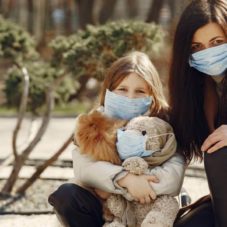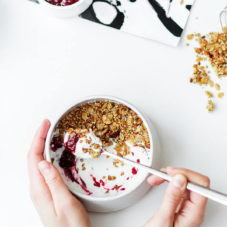We all could use a healthy immune system right now. There’s a global pandemic going on and there’s no end in sight – yet. But it’s not just COVID-19 we need to be worried about. There are plenty of unseen pathogens around us, just lying in wait to get inside our bodies. A healthy immune system may not make us invincible, but it will help protect us from infection and disease. That being said, boosting our immunity should be our number one priority right now. In this article, you’ll learn how to boost your immune system naturally.
7 Ways To Help Boost Your Immune System Naturally
Tip #1: Proper Nutrition Is Important
Junk food always seems like a good idea, doesn’t it? It’s cheap and available practically everywhere. Flavor-wise, there’s junk food for every flavour under the sun. But you and I both know junk food is far from healthy. It’s calorie-rich but offers very little-to-nothing in terms of nutrition.
If you want to boost your immune system naturally, then you need to cut junk food out of your life. Instead, start eating healthy, unprocessed foods. Healthy eating means lots of veggies and fruits, and proteins like fish, chicken, and meat.
According to a 2018 study, nutrition plays an important role in immune cell metabolism and function. Both undernutrition and overnutrition are bad for the body. Undernutrition makes you susceptible to infection and disease, whereas overnutrition is associated with low-grade, chronic inflammation (1).
Ideally, you should eat a variety of foods to get all the vitamins, minerals, and nutrients your body needs. This infographic from the Harvard School of Public Health’s Department of Nutrition is an excellent reference:

Image credit: Copyright © 2008. For more information about The Healthy Eating Pyramid, please see The Nutrition Source, Department of Nutrition, Harvard T.H. Chan School of Public Health, www.thenutritionsource.org, and Eat, Drink, and Be Healthy, by Walter C. Willett, M.D., and Patrick J. Skerrett (2005), Free Press/Simon & Schuster Inc.
Tip #2: Get Quality Sleep At Night
Don’t underestimate the power of sleep. You can get away with a lack of sleep every once in a while, but don’t make it a habit. Quality sleep helps the body recover. When you wake up from a long, deep sleep, you feel refreshed and energized. This is because when you sleep, your body rests and recovers itself to prepare for the next day.

One of those that benefit from a good night’s sleep is our immune system’s T cells. These T cells fight virus-infected cells and other intracellular pathogens. In a study by Dimitrov et al., they discovered that volunteers who had a good night’s sleep had better functioning T cells than the volunteers who stayed awake all night long (2). What this essentially means is that getting quality sleep is necessary for your immune system to function properly.
At a minimum, you should aim for 7 hours of sleep every night. Make your bedroom conducive for sleep by making it cool and well-ventilated. Also, put your electronic devices out of arm’s reach, so you don’t get tempted to scroll through your social media feeds late at night.
Related article: Is a Lack of Magnesium Causing Your Insomnia?
Tip #3: Minimize stress
Stress can’t be avoided entirely. In fact, we likely experience stress in one form or another every single day. Stress makes our heart pound, our pulse and our breath quicken, our mouth dry, and our muscles tense.
That being said, not all stress is bad. In fact, short-term stress can be a powerful motivator. It can help you ace exams, interviews, presentations, and more. It can help you survive in life or death situations as the stress hormone – called cortisol – can trigger your body’s fight or flight response.

But if your stress levels don’t go down to normal soon, then stress becomes chronic. Researchers analyzed over 300 studies on the relationship between psychological stress and the immune system. They determined that short-term stress which elicits our fight or flight response makes positive changes in the immune system. However, chronic stress (such as constant worries about money, health, love, relationships, etc.) led to more negative, detrimental changes in our immune system (3).
Dealing with too much stress can make you sick mentally, emotionally, and physically. Fortunately, there are ways to minimize or reduce its effect on our psyche, our immune system, and our body as a whole. These include:
- Distancing yourself from whatever it is that’s causing you stress
- Carefully planning how you can overcome the stress
- Practising mindfulness meditation to raise awareness, improve concentration, and reduce stress
- Having a sense of humour to help you turn the negative into positive
- Sharing your burdens with someone, e.g. family, friends, or a health professional
Tip #4: Be more physically active
Being a couch potato isn’t cool at all. A sedentary lifestyle can cause a condition known as “sitting disease,” where those who spend most of their time sitting down fall victim to a variety of chronic diseases.

An inactive lifestyle brings about a ton of health consequences, including premature death. Very little calories are burned, so all the extra calories get stored in the body as fat. Metabolism slows down. Hormonal imbalance and chronic inflammation soon develop. The extra weight puts a strain on lightly used muscles and bones. All these contribute to a weaker immune system.
And it gets worse. The older you get, the weaker your immune system naturally becomes. If you continue living a sedentary lifestyle till then, the higher the risk of infection and disease. But if you engage in at least moderate-intensity exercise, then your immunity is enhanced and the risk of getting an infection goes down (4).
So, start moving around! Start light and slow (read our article on how to exercise at home). You don’t need to buy expensive equipment to workout. Doing a bit of cardio is absolutely fine in the beginning. Push yourself to gradually move on to the next stage but listen to your body as well. Moderate intensity workouts help boost your immune system naturally but don’t overdo it as you may injure yourself and potentially weaken your immunity (5).
Tip #5: Take an immunity-boosting supplement
Eating healthy food is still the best way to boost your immune system naturally, but not everyone can afford to buy, prepare, and cook healthy foods every single day. Meal prep does help, but it’s still time-consuming. For busy individuals who also want to boost their immunity, taking a dietary supplement is the way to go.
Tip #6: Stick to a routine
A routine may be boring for daredevils, but it’s actually really good for your health. Sticking to a routine means you have peace of mind – your day has a structure and you’re able to plan your hours accordingly for work, play, and sleep. Knowing what comes next on your schedule helps reduce stress and gives you more control over your day.
Now, one of the best ways on how to boost the immune system naturally is by adding healthy habits and removing unhealthy ones. However, this process of setting new habits and forgetting old habits takes time. You need to do the process consistently, i.e. turn it into a routine. Eventually, your routine will turn into a habit and you’ll be able to do it without even thinking about it.

For instance, if you’re trying to be more physically active, you can wake up earlier in the morning and walk or run around the block a few times. Then when you finish, prepare and eat a healthy breakfast, and leave for work. Do this new routine every day, and you’ll soon turn it into a healthy habit!
Tip #7: Practice good hygiene
You can eat a healthy balanced diet and live a physically active lifestyle. But if you don’t practice good hygiene, you’re unnecessarily exposing yourself to harmful pathogens and creating a problem for your immune system.
Proper hygiene can save you from serious infections. Wash your hands often, such as before and after handling food or using the toilet. Take a shower regularly to remove the germs and bacteria on your skin and hair. Brushing and flossing your teeth is important for dental health as well. Trimming your nails is important too as it can harbour germs from dirty stuff you come into contact with.
In addition to helping your immune system, good hygiene also has a positive effect on your mental and emotional wellbeing. Plus, you’re also helping the people around you by taking care not to spread any harmful pathogens.
Conclusion
Everyone should know how to boost the immune system naturally. It is our body’s first line of defence against infection and disease, after all. So, do let your family and friends know about these tips so they too can have better immunity!
References
(1) Alwarawrah, Yazan et al. “Changes in Nutritional Status Impact Immune Cell Metabolism and Function.” Frontiers in immunology vol. 9 1055. 16 May. 2018, doi:10.3389/fimmu.2018.01055
(2) Stoyan Dimitrov, Tanja Lange, Cécile Gouttefangeas, Anja T.R. Jensen, Michael Szczepanski, Jannik Lehnnolz, Surjo Soekadar, Hans-Georg Rammensee, Jan Born, Luciana Besedovsky; Gαs-coupled receptor signaling and sleep regulate integrin activation of human antigen-specific T cells. J Exp Med 4 March 2019; 216 (3): 517–526. doi: https://doi.org/10.1084/jem.20181169
(3) Segerstrom, Suzanne C, and Gregory E Miller. “Psychological stress and the human immune system: a meta-analytic study of 30 years of inquiry.” Psychological bulletin vol. 130,4 (2004): 601-30. doi:10.1037/0033-2909.130.4.601
(4) Simpson, Richard J, and Keith Guy. “Coupling aging immunity with a sedentary lifestyle: has the damage already been done?–a mini-review.” Gerontology vol. 56,5 (2010): 449-58. doi:10.1159/000270905
(5) Simpson, Richard J et al. “Can exercise affect immune function to increase susceptibility to infection?.” Exercise immunology review vol. 26 (2020): 8-22.





